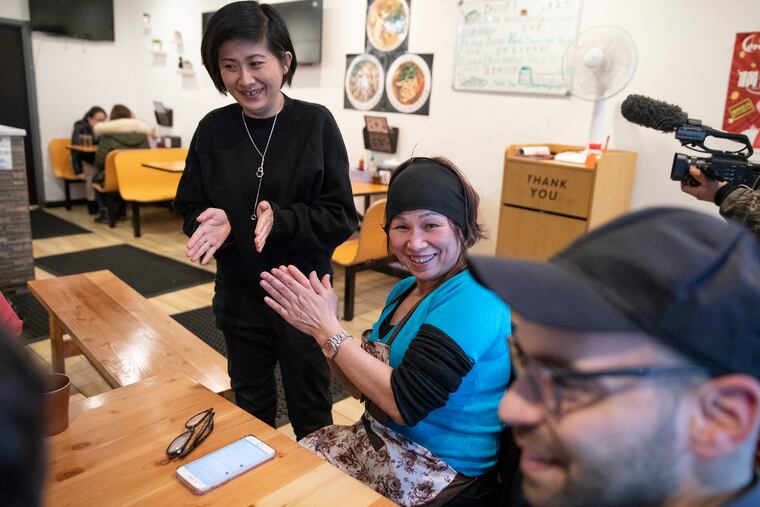Two international artists have come to Philly to sing songs about work with strangers
The city’s only sound art gallery is currently hosting “Singing is what makes work possible,” a group research project where participants learn songs sung during acts of labor.

Just before the dinner rush, Lily Yau emerged from the Hidden Gem kitchen.
With her apron still on, Yau stood in her Chinatown cafe — a small, bright place on 10th Street that evokes home for those who grew up abroad with its Hong Kong-style French toast, big bowls of spicy noodle soup, and homemade chili oil — and as the music played from a Bluetooth speaker, she began singing the Cantonese version of a Taiwanese song made popular in the ’80s among the working class. Loosely translated, it’s called “You have to work hard in order to win.”
And then, the hard part: teaching the song to her students, who didn’t know a lick of Cantonese.
This was a “study session,” as conceptualized by artists and professors Hong-Kai Wang and Bill Dietz as part of their nearly monthlong project “Singing is what makes work possible,” in which participants learn songs people sing during work. The pair came to Philadelphia — Wang from Taipei and Dietz from Berlin — on the invitation of a new sound art gallery in Kensington called Remote Viewing, which might be the only space dedicated to sound and media work on the East Coast, its founders Geoff Mullen and Eric Laska say. They knew Wang and Dietz through the “sound scene": Laska, 32, runs an “online journal of contemporary sound” called Lateral Addition; Mullen, 39, studied under Dietz.
“Singing” is the second project hosted by Remote Viewing. The first, a monthlong exhibit in February, was orchestrated by Barcelona electronic musician Rubén Patiño, who worked with sounds like laughter to transform Remote Viewing’s space into a dark and strange environment to explore, Laska said. Patiño’s exhibit and “Singing” are exactly the kind of unconventional projects Laska and Mullen wanted to cultivate, and because Philadelphia still has relatively affordable rents, they said, it makes it easier for artists to open their own galleries.
That affordability is especially useful for this kind of experimental sound art because it’s not inherently commercial, Laska said.
(And while the first two exhibits have been from international artists, Laska and Mullen don’t know if that will always be the case. Singing was backed in part by the Taipei Cultural Center in New York.)
“Singing” is something of a group research project in which participants learn about work songs — and not just conventional paid labor, but spiritual labor, such as Shaker songs, or reproductive labor, the focus of last Saturday’s study session, where participants learned a song sung by Afro Colombian midwives.
>> READ MORE: 3 Asian American artists talk labor: The emotional, the invisible, the inconsequential
The idea, Wang said, is to honor songs of everyday life, the kind of art that is often overlooked or forgotten. And the act of singing aloud is crucial to the project, said Wang and Dietz, so participants can think about the relationships between music and labor, not just intellectually, but physically.
After learning a song, participants go home with an assignment so the project lives beyond the session. One exercise reads: “When possessed by an anonymous sense of affinity or alienation, sing about it. Start with a line or two, & repeat that whenever the sensation returns, expanding over time. Record your practice.”
Each study session features a special guest — Penn music professor Jairo Moreno was Saturday’s speaker — but it’s less of a student-and-teacher interaction: Everyone, including Wang and Dietz, both of whom teach in Bard College’s Master’s of Fine Arts program, learns the music together. It’s a way, Dietz said, to invoke the “creativity of the masses” that Trinidadian historian and activist C.L.R. James described.
“We meet each other as messier subjects,” Dietz said.
The Hidden Gem study session was something of a fluke: Wang and Dietz discovered the cafe and kept returning to eat, so they broke with form and decided to ask Yau if she’d lead a session. She obliged, choosing the song, putting on her tortoise-shell glasses to read the lyrics from her phone, and painstakingly repeating each line for the participants as they copied down a phonetic score.
By the end, Yau was pleased, even if her students could get through only the first verse.
“I’m a teacher now,” she said, laughing.
Soon after, hungry customers began arriving.
The final event of “Singing,” when Wang and Dietz will present the project and play recordings of the study sessions, will be from 6 to 9 p.m., Saturday, April 6, at Remote Viewing, 2131 N. American St. Philly conceptual artist Tiona Nekkia McClodden will also speak.
>> READ MORE: 14 murals in Philly that speak to the Asian experience